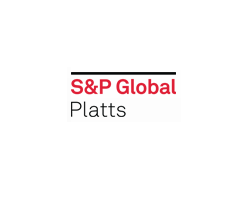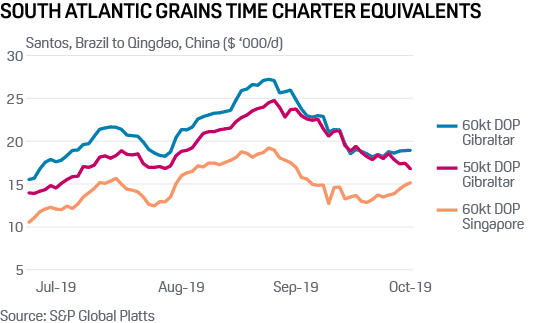Atlantic Dry Freight Braces for Impact in Q4

October 10, 2019 - There may be sleepless nights ahead for Atlantic dry bulk companies, as the IMO 2020 marine fuel sulfur cap's January 1 implementation date looms like a storm cloud over the industry.
But while the headlines focus on emissions, the sudden collapse of Athens-based ship operator Medmar has exposed the real-world risks of the volatile Atlantic market, and coal stockpiles in Europe are putting a lid on trans-Atlantic mineral flow.
As the hazards pile up, and the rates tick down, what can market participants expect in the final quarter of 2019?
There's Something About January
Throughout the third quarter, the volatile prices of high sulfur fuel oil (HSFO), 0.5% marine fuel (VLSFO) and marine gasoil (MGO) caused rapid and unpredictable fluctuations in voyage rates across the Atlantic basin.
Uncertainty surrounding IMO 2020 compliance appears set to continue, as market principals announce diverging strategies for meeting the emissions standards from January 1 onwards.
A sliver of clarity does, however, appear to be on the horizon -- as the market transitions from using predominantly HSFO over the next three months, the economic viability of the various IMO 2020 compliance methods will finally be tested in a live environment.
Nevertheless, the sulfur cap's impacts are already being felt across sectors, as deals are reported in the markets based on expectations of how much HSFO is likely to remain in fuel tanks as at January 1, with premiums being sought for scrubber-fitted ships.
"We need to stop talking about IMO 2020 as some future event," said Jason Klopfer, commercial director at Navig8, at the tankers panel during the ASBA Cargo Conference in late September. "We're in the middle of it now -- we're seeing increasing volatility already."
Medmar's Collapse
But with all the chaos surrounding IMO 2020, it is worth remembering that there are other problems facing the market.
After Medmar -- the 50-year-old ship operator -- collapsed in early October, the market's eye turned to hedging risk against unpredictable time-charter rates in the dry bulk sector.
Medmar ceased all operations in the first week of October, having been unable to hedge its exposure to market volatility on grains cargoes from the East Coast of South America. Medmar is reported to have booked several cargoes to the Far East before Q3's sudden spike in South Atlantic time-charter rates across the Supramax to Kamsarmax vessel range.
China's infrequent US-sourced purchases have caused havoc in the South Atlantic, with relentless Brazilian and Argentinian grains exports continuing to underpin the dizzying highs of August/September after a weak first half of the year.
Between July 1 and September 1, the S&P Global Platts time-charter equivalent assessments on Santos to Qingdao, 60,000 mt and 50,000 mt grains cargoes leaped 73% and 78% respectively.
With further volatility undoubtedly ahead, principals may well be seeking to minimize their exposure through increased hedging to prevent them selves being the next headline.

Winter is Coming
Nevertheless the market rolls on, and as winter approaches, the eyes of Atlantic chartering managers would normally be tracking north, towards coal supplies from the US into Europe.
With some meteorologists predicting the coldest European winter since 2013, coal purchases might be expected to fill the ton-mile demand void left by limited grains exports.
While investigating a vortex of Arctic air over the North Atlantic, climate scientists at University College London recently told The Sunday Times: "This would rank the 2020 January-February central England temperature as the coldest winter since 2013... It would also rank January-February 2020 as the seventh coldest winter in the past 30 years." However, extensive European stockpiles of Russian coal, combined with falling gas prices and a glut of LNG supply, mean that US-sourced coal currently appears unattractive on a CIF basis. Platts' International Coal Report's CIF ARA thermal coal outlook for Q4 2019 turned bearish, with sources predicting that prices in the high $50s/mt-low $60s/mt cannot be sustained.
So, with coal demand declining and grains exports held in check by Chinese tariffs, the market's mantra -- "cargo is king" -- seems set to define Atlantic dry bulk's final push into 2020 just as much as the IMO's imminent regulation.

